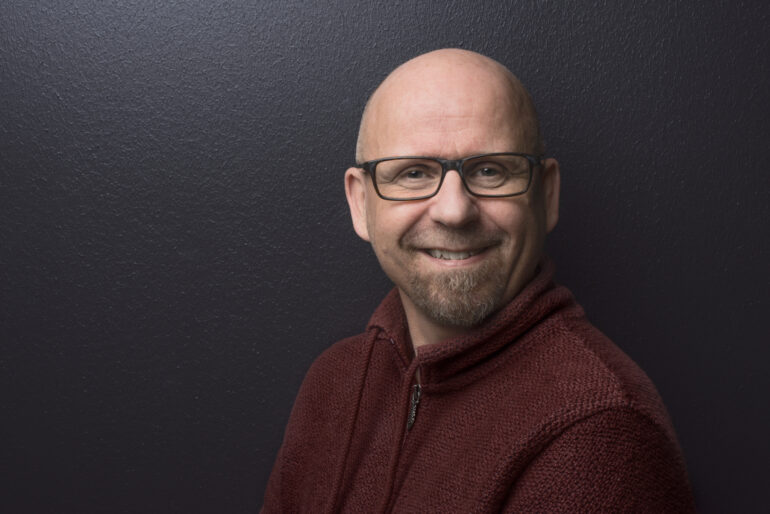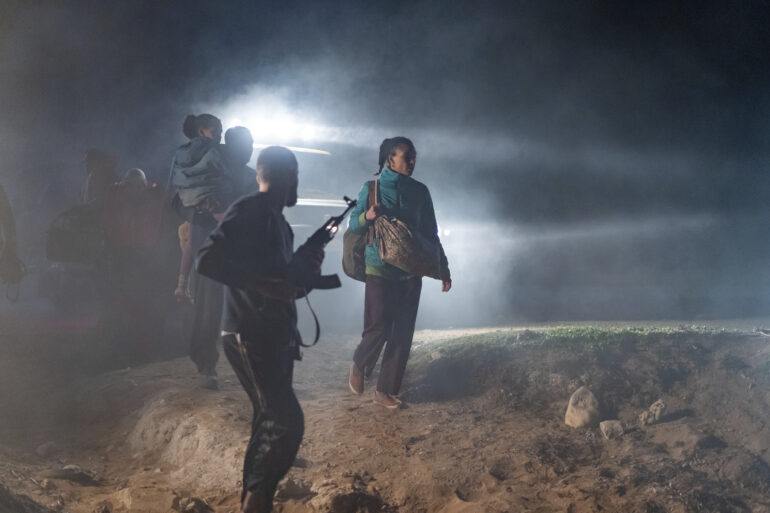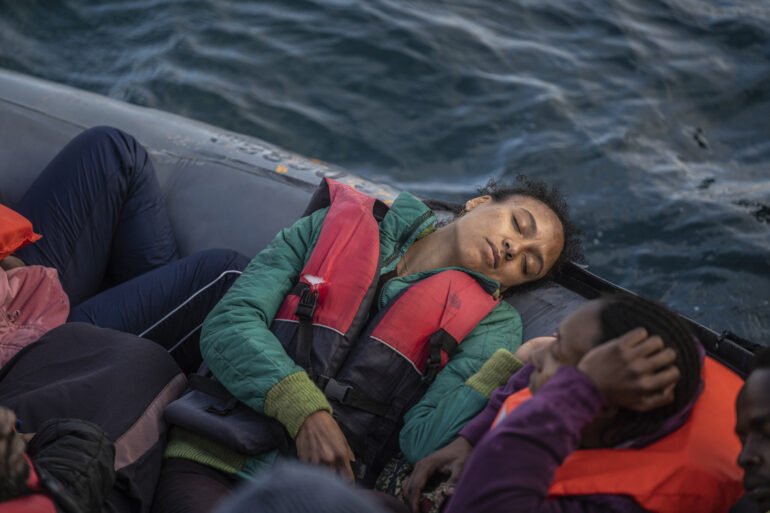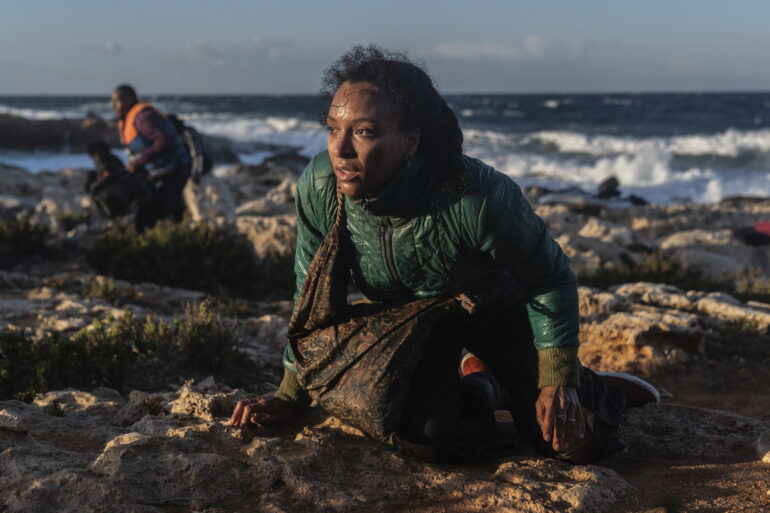Written by: Annika Pham
22.01.21
Creator/writer/director Matti Kinnunen is nominated for the series Cargo produced by Fremantle Finland for Yle.
Kinnunen is among five screenwriters competing for the Nordisk Film & TV Fond Prize-Best Screenplay of a Nordic drama series. The winner will be announced on February 3rd during the virtual edition of Göteborg’s TV Drama Vision.
Kinnunen studied economics and communication before turning to screenwriting and directing. He has written and directed several drama series (Secret Lives among others) and two feature films - Miss Blue Jeans (2012) and Time Out (2018).
Kinnunen serves as creator, head-writer and director on the eight-part series Cargo (Rahti) produced by Fremantle Finland for Yle.
The social thriller expands from human smuggling in Finland to international human trafficking.
Kiki, the main character, gets separated from her husband and daughter as they flee to Finland, and she sets out on a desperate quest to be reunited with them.
Elsewhere, two down and out brothers steal a van unaware that there are people hidden inside. The two plots intertwine as the story of Maria, an immigration lawyer develops. After waiting years to adopt, she becomes the legal guardian of a child whose parents’ whereabouts are unknown.
In some of the title roles are Norway’s Evelyn Rasmussen Osazuwa (The Oil Fund) Finland’s Johannes Holopainen (All the Sins), Amos Brotherus (Dogs Don’t Wear Pants), Oona Airola (The Happiest Day in the Life of Olli Mäki), and France’s Alain Azerot (Black Earth Rising).
The series was produced by Fremantle Finland’s Kirsi Hatara, Rea Dominicy and Joonas Hytönen for Finnish pubcaster Yle, with co-financing from DR, NRK, SVT, RÚV, Business Finland and support from Nordisk Film & TV Fond.
The series will premiere on Yle in the fall 2021. Fremantle handles world sales.
What does it mean for you to be nominated for the Nordisk Film & TV Fond Prize?
Matti Kinnunen: A lot, so much. This has been an exceptionally challenging project with many twists and turns, which makes the nomination even more special. It’s like having an olive wreath put around your neck after a marathon: we made it to the finish line.
When did you get into screenwriting and why?
MK: In film school I studied both writing and directing. Directing felt more natural; I had an innate fear of writing. Singing in front of the class in elementary school was nothing compared to the thought that my text would be read aloud to others. But when I graduated from film school and didn’t find a project I could direct, I put pen to paper and started writing, first for myself but later for other directors as well. I worked a long time only writing, which has been a crucial phase of my career. What has been even more crucial is understanding how much more rewarding writing is when I don’t do it alone. Today, writing means talking, a dialogue, which I enjoy a great deal.
What type of stories are you drawn to?
MK: I like it when the story has a social aspect and meaning.
How did you come up with the idea for Cargo?
MK: I happened to come across a piece of news about a smuggler who tried to bring people hidden in the structures of a van into the country. This was before 2015, the year of Europe’s refugee crisis, which changed everything. I remember thinking that I’ll probably see more news like this in the future, but I could never expect what happened later.
How did you split the writing duties with Johanna Hartikainen, Tarja Kylmä, Veikko Aaltonen?
MK: The four of us never worked together at the same time. First I sketched the basis for the story, characters and themes, and Veikko and I continued from there. He has a good nose for plot, and Johanna, on the other hand, is especially skilful with characters and dialogue. Tarja Kylmä started as a dramaturgist but ended up writing the final versions with me. We also got good backup from YLE’s Leena Virtanen and Stockholm-based script consultant wizard Johanna Ginstmark.
Was the writing pretty much finished when you started filming as you were directing the full show and why did you decide to take full control of the entire series as a director as well?
MK: It was clear from the beginning that I would direct the series if it were to go into production. The scripts were practically finished when we started shooting, but I like to work on scenes with actors when we’re rehearsing and even shooting. The working method had an exceptionally big importance, as we found actors who had first-hand experience of being in exile.
What were your inspirations for the show?
MK: Abi Morgan’s Sex Traffic and Jacques Audiard’s Dheepan.
How much time did you spend on research and how difficult was it to get first-hand information about the human trafficking criminal activities in Finland?
MK: We started the project in 2012, but the first version of the first episode wasn’t written out until April 2016; it says a lot about what the project was like. The events of 2015 caused people to say the theme was too current. Jarmo Lampela starting as Yle Head of Drama was a lucky stroke for the series; he saw the potential in it and started steering it towards production with determination.
The series has two intertwined stories, with Kiki, the young Eritrean’s plight for survival and to be reunited with her family in Finland, and Riku, the small-time crook and his brother. Can you explain how you structured the plot to keep the tension at every level while maintaining the focus on the human stories?
MK: In Kiki’s story, it’s important that the viewers know what’s happening to her family and especially her daughter Liah. When it comes to the evil, I drew the line at illegal adoptions, which is one of the sad aspects of human trafficking; I didn’t feel a need to open the whole Pandora’s box of the brutalities in human trafficking.
In Riku’s story, I attempted to make space for lighter elements, yet be careful not to slip out of the genre. The auto repair shop of Riku and his brother is a kind of metaphor for Finland. The brothers try to survive hiding behind the fences until the outside world enters without warning and challenges their illusions about where the borders of their property are.
The stories intertwine in episode 3 where a third storyline starts: the story of Maria, an immigration lawyer. As the story progresses, she becomes the true antagonist of the series, a person who wants to do good for everybody without understanding what’s best for herself.
The casting must have been a huge challenge with the variety of nationalities portrayed - Finnish, Eritrean, Italian, Afghan. Can you tell us about the casting process and how you found some of the key non-Finnish actors such as Evelyn Rasmussen Osazuwa from Norway and Alain Azerot from France?
MK: Producers Rea [Dominicy] and Kirsi [Hatara] and my son Niilo did the casting with me. For the most part, we had to find the actors in Finland due to financial realities. We ended up having very few auditions, but we did do a lot of background research: we Googled, called people, turned stones and cast nets.
Finding Evelyn was a miracle at a moment when I had almost lost hope. I skyped with her, and it was clear that she would be our Kiki. My relief was indescribable when she read the script and said she wanted to do the role.
Alain, on the other hand, was found by Rea. It’s incomprehensible yet says a lot that I had never heard of him, even though he has lived a short period in Finland in his previous life and worked at the Helsinki City Theatre.
What were the biggest challenges during filming?
MK: We had a lot of amateur actors in the film, children and first-timers. I spent a lot of time with them during the shooting compared to the time I had for the shooting. I took a risk, as time was limited, and every second I used on one thing was a second away from something else.
What’s next for you?
MK: I’m finalising the script for a series focusing on the year 1991 when Finland was close to going bankrupt.
In what way has the pandemic impacted your life and work?
MK: The pandemic hasn’t affected the television and film industry as deeply as it has affected theatres, for example. Surely it did hurt our series but it could’ve been a lot worse.
Can you cite the top 3 TV shows (Nordic or non-Nordic) that you’ve watched recently?
MK: Unorthodox, Cry Wolf, The Queen’s Gambit.
FOR FURTHER INFORMATION AND TO READ ABOUT ALL THE 2021 NOMINEES FOR THE NORDIC FILM & TV FOND PRIZE FOR OUTSTANDING WRITING OF A NORDIC DRAMA SERIES: CLICK HERE.



